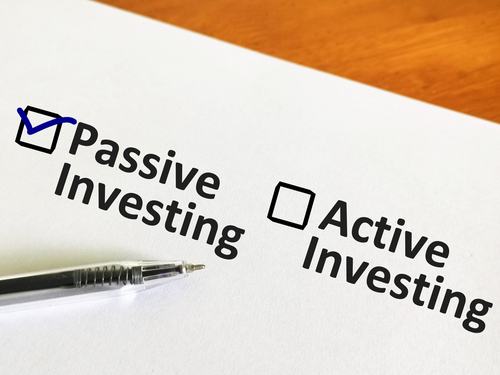There’s lots of money to be made in real estate, whether you’re passively investing or managing a rental business. However, if you want to reap the benefits without putting in much effort, you’ll want to consider investing passively. Luckily, there are several ways investors can make money with passive real estate investments. If you want to learn more, read along as we go over a full guide for investors.

Contents of This Article:
- What Is Passive Real Estate Investing?
- Types of Passive Real Estate Investments to Consider
- Active vs. Passive Real Estate Investing
- Pros and Cons of Passive Real Estate Investing
- How Property Management Can Help You Invest
What Is Passive Real Estate Investing?

There are several ways to make money with real estate. While most people think of rental property owners or house flippers, there are ways to invest without putting in much effort. That said, if you want to invest without maintaining or managing properties, you’ll want to consider passive real estate investing.
Passive real estate investments allow you to earn extra income without too much effort. Some of the most common passive real estate investments include real estate investment trusts (REITs), crowdfunding ventures, and more. These options allow you to invest in real estate without buying properties. Read along as we go over more investment strategies to consider.
Types of Passive Real Estate Investments to Consider
If you’re looking to invest in real estate without managing properties or flipping homes, you’re in luck. Several passive investment strategies don’t require the work of a full-time job. That said, here are some of the most popular passive real estate investments to consider.
- Rental Properties
- Turnkey Real Estate
- Real Estate Investment Trusts (REITs)
- Crowdfunding
- Real Estate Syndication
Rental Properties
Although rental properties are generally active investments, they can also be passive. For instance, you can hire a property management team to manage your investment instead of doing all the work yourself. That way, you can sit back and watch the rental income roll in while trusted Northern Virginia property managers work with tenants and contractors.
Remember that investing in property management also costs money, so you’ll need to consider management fees. For example, some companies charge around 4% to 12% of your monthly rental income, while others charge a flat fee depending on the property type.

Turnkey Real Estate
Another investment strategy that’s popular among beginner investors is turnkey real estate. Turnkey rental properties are ready to buy and rent out to tenants immediately. Generally, they’re newly constructed homes or renovated rentals with the amenities and utilities needed for tenants.
Most companies that sell turnkey rentals also offer property management services. That way, you don’t have to manage your rental property, making it a passive investment strategy.
Real Estate Investment Trusts (REITs)
Investing in real estate investment trusts is another popular passive investment strategy. Real estate investment trusts own and operate income-producing real estate. That said, investing in REITs is similar to investing in stocks since it’s completely passive.
Once you purchase REIT shares, you can start earning passive income from your investment. Then, REITs take care of the rest, whether it’s managing properties, collecting rent, funding mortgages, etc.
Crowdfunding
Another great passive investment strategy is real estate crowdfunding. Crowdfunding is a unique strategy that allows you and other investors to contribute money to fund a new property. This is a great strategy for beginners or those that don’t have much capital since most platforms allow you to invest small amounts of money.
Additionally, it’s a truly passive investment strategy since you don’t have to deal with properties or tenants. Instead, you can buy contribute money via online fundraising for current or prospective rental properties.
Real Estate Syndication
Finally, real estate syndication is another way to invest without actively managing properties. It’s similar to crowdfunding, where several investors come together to obtain a property they couldn’t purchase alone. Syndication is popular for large commercial investments or investors that want more properties but don’t have time to manage them.
However, it’s different because the property is owned by a syndicator or sponsor who actively manages it. On the other hand, syndication investors just provide capital and earn a percentage of profits without dealing with day-to-day matters.
Active vs. Passive Real Estate Investing
The difference between passive and active real estate investing is the amount of time and effort you put into the investment. For instance, if you’re passively investing, you don’t have to put in the extensive effort. But on the other hand, active investments are more time-consuming.

Generally, active real estate investments are rental homes or fix-and-flip properties. In these instances, you’re either actively managing tenants and rental properties or fixing up properties to sell. That said, you have more responsibility with an active investment.
For instance, rental properties require a lot of effort from landlords. Some responsibilities include finding and buying properties, renovating properties, finding tenants, drafting lease agreements, tending to tenants, and more. As such, if you’re thinking about investing in rental properties, make sure you know what you’re getting into.
While choosing between an active or passive investing strategy, you must consider how much time you’re willing to invest. Additionally, think about your level of involvement. Active investments are the way to go if you want full control of your investment. However, if you don’t have the time to dedicate toward your investment, consider a passive strategy instead.
Next, let’s go over the pros and cons of passive real estate investing.
Pros and Cons of Passive Real Estate Investing
Investing in real estate has its pros and cons, and so does each investment strategy. That said, let’s go over some of the benefits and disadvantages of passive real estate investing.
Pros of Passive Investing
- Less Captial Required- You can passively invest in real estate with just a small amount of money. Although you won’t be able to buy a whole property, you can invest in crowdfunding or REITs with just a few hundred dollars.
- Better Liquidity- Passive investments offer better liquidity than active investments, so you can make moves quickly.

- Less Time and Effort- You don’t have to put in a lot of work to invest passively. Instead, you can simply invest your money and watch the income roll in.
Cons of Passive Investing
- Not as Profitable- Active investments are often more profitable than passive ones but require tons of extra work. Nevertheless, passive investments may earn less capital than active rental property investments.
- Less Control- When you passively invest, you don’t always fully control your investment. Instead, the person who runs the syndication or REIT controls property management.
- Market Fluctuations- No matter how you invest in real estate, you must watch for market fluctuations. Unfortunately, fluctuations can hurt your profits even if you’re not personally managing a property.
How Property Management Can Help You Invest
Passive real estate investing is a great strategy for anyone who wants to earn income without much effort. That said, if you want to own rental properties but don’t want to put in the time and effort, property management can help.
Need More Advice? contact BMG today!
Bay Property Management Group offers comprehensive services to help busy investors with the day-to-day tasks of owning a rental. Whether it’s marketing properties, screening tenants, performing maintenance, or collecting rent, we’ve got you covered. Contact BMG to learn more about our services today.

